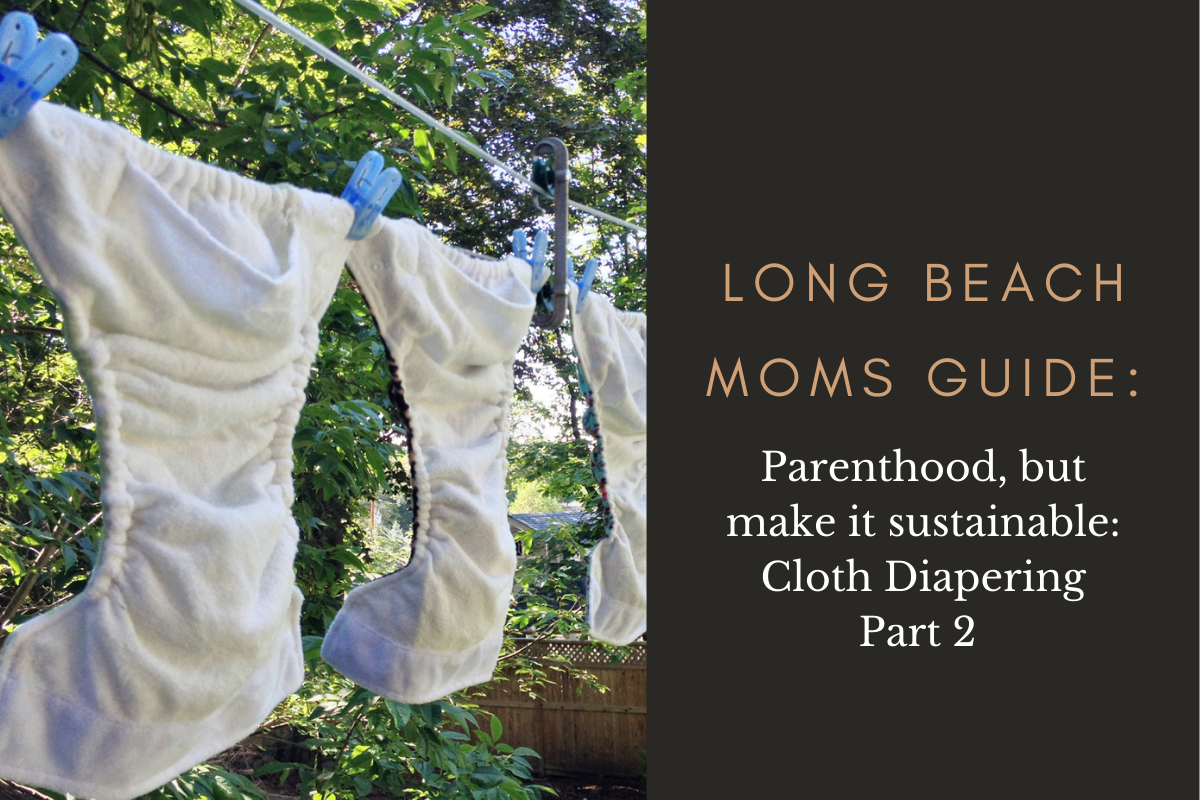Long Beach Moms Guide: Parenthood, but make it sustainable: Cloth Diapering Part 2
Parenthood, but make it sustainable: Cloth Diapering Part 2
by Nicolette Zangari, M.A
a member of Long Beach Moms since 2021
The choice to go with cloth diapers is a personal one. It doesn’t appeal to everyone (understandably), and it does take time, financial resources, and the support of other caregivers. Disposables may be the best fit for some, and that’s okay.
That being said, here are some of the reasons that led me to cloth diaper and also some of the drawbacks I encountered along the way:
Reasons to cloth diaper:
- Cloth diapers dramatically reduce the amount of landfill waste produced compared to disposable diapers.
- They do not contain toxic chemicals, bleaches, dyes, or fragrances like most disposables, and they reduce exposure to allergens.
- The overall cost of cloth diapers is often lower than disposables.
- They are extremely cute—have you seen all the different patterns they come in?
- I genuinely enjoy troubleshooting when issues arise (i.e., How many inserts should we use to increase absorbency? What materials are good for wetness sensitivity? How do I get my diapers to be cleaner?). Honestly, this is what kept me going during maternity leave, which I found to be quite boring.
- They are super easy to wash!
- If you hang them out to dry (which we do) the sun will magically bleach them white again! Plus, you use much less energy this way.
- I enjoy the mindless chore of folding and putting them away. It buys me a few minutes of alone time.
- You will never run out of diapers or have to make an emergency trip to the store, say, during a pandemic.
- You can use the same diapers on multiple children or pass them along to another family when you’re done.
Reasons not to cloth diaper:
- Some sources say the water footprint of a cloth diaper made with cotton is similar to that of disposables when you consider the energy and resources required to produce and launder cloth diapers. However, there are more ways to mitigate your water and carbon footprint with cloth than with disposables, which weakens this argument. For example, buying second-hand diapers, using them on multiple children, washing in cold water, line drying, etc. are all actions that can tip the sustainability scale in favor of cloth. The truth is, there is no perfect solution to the diaper dilemma. Both options are wasteful in different ways.
- When your baby starts eating solids (usually around 6 months), you will have to find some method of removing the poop from the diaper before washing.
- You’ll have to add more laundry to your to-do list.
- Some people find it inconvenient for traveling or going out because you have to tote your dirty diapers around with you. I personally do not find this inconvenient. I have taken my son on multiple flights and day trips and have brought my wet bag for the dirty diapers. I honestly don’t think twice about it.
- The initial up-front expense is higher than disposables (unless you are the lucky recipient of hand-me-downs!)
- Some people experience leaks and find this frustrating. Personally, I enjoy the challenge of figuring out the right combination of inserts to solve the problem. *Cloth diaper nerd alert* If the absorbency and fit of the diaper are right, and you don’t have detergent build-up, you should not experience leaks.
- Lack of support from childcare providers/in-laws/spouses. It’s really tough when your daycare says cloth is a no-can-do. For me, this was a deal breaker for daycares. Luckily, it seems that many places in Long Beach are at least open to learning.
- Cleaning poop.
The middle ground
This does not need to be an all-or-nothing choice. You don’t need to cloth diaper full time in order to do it at all. I try to find the middle ground wherever I can instead of trying to be perfect. For example, we had to start using disposables at night because my son kept waking up in his cloth diapers when he turned one. I drive a hybrid because electric was out of our price range. We are weekday vegetarians (i.e., we don’t eat meat Monday – Friday).
When it comes to sustainability, the middle ground is rarely recognized. My goal is to make the most sustainable choices I can, where and when possible, even if I need to sacrifice some convenience. But sometimes it is just not possible to make the *perfect* environmentally-friendly choice, and in those instances, I try to show myself some compassion.





